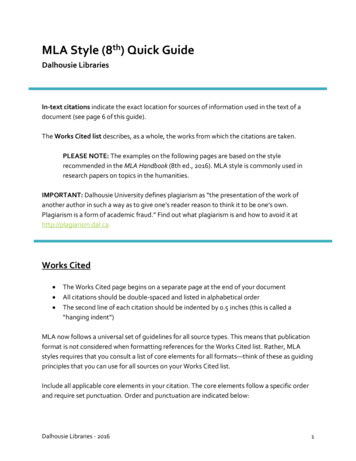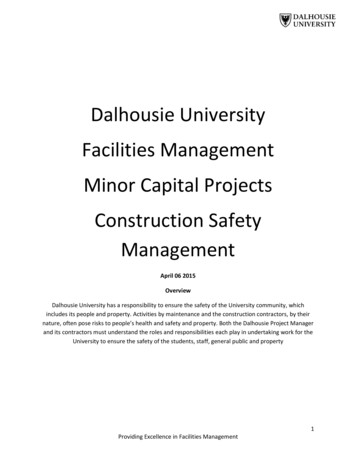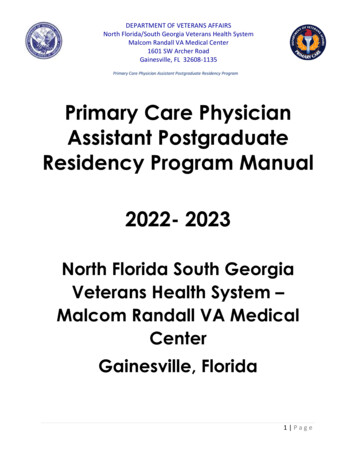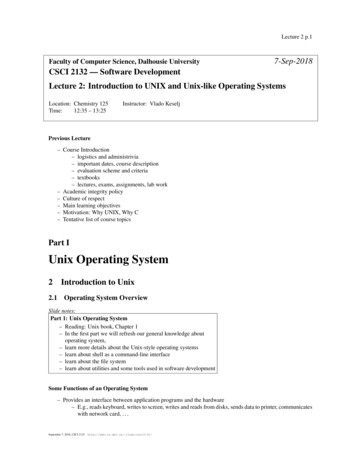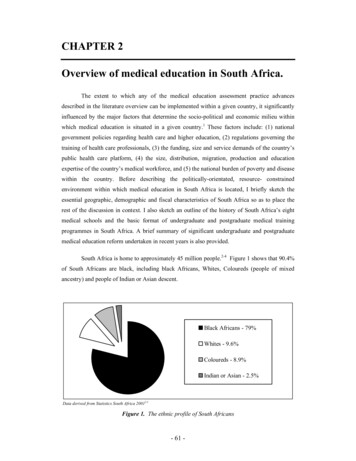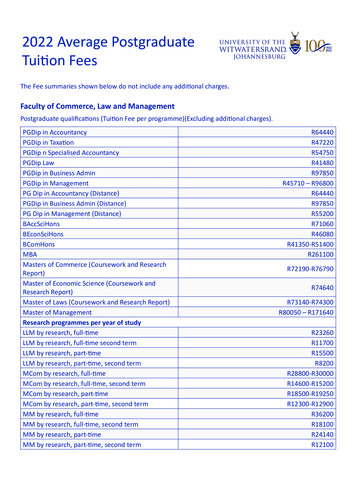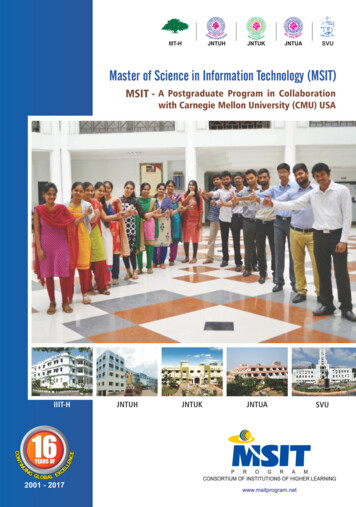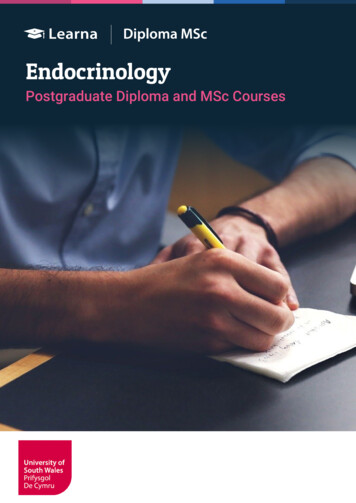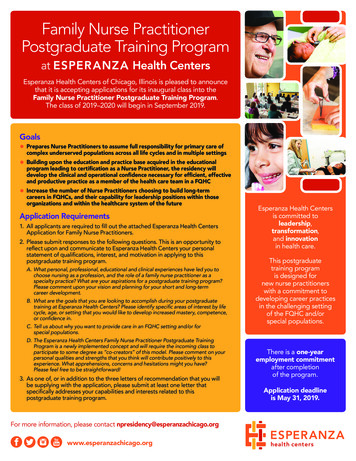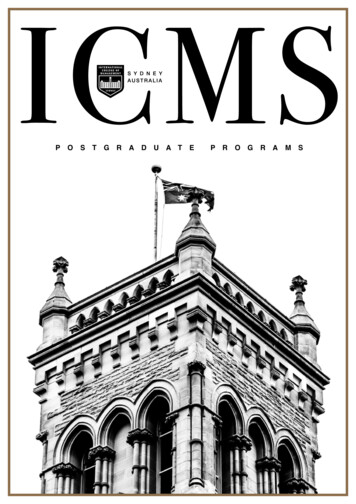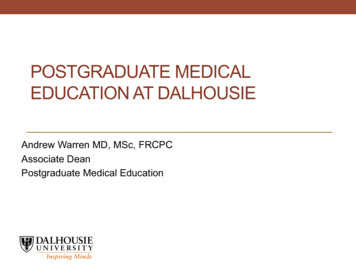
Transcription
POSTGRADUATE MEDICALEDUCATION AT DALHOUSIEAndrew Warren MD, MSc, FRCPCAssociate DeanPostgraduate Medical Education
Objectives At the end of this presentation theparticipant will be able to: Describe the different types of postgraduatemedical trainees and their respective fundingsources Discuss the differential funding of postgraduatetraining positions by provinces List some challenges for the future of PGME
Types of Trainees Direct Entry Resident – A postgraduatetrainee who enters a program leading tocertification in a specialty, subspecialty orfamily medicine directly out of medicalschool Eg. Internal Medicine, Orthopedics,Ophthalmology, General Surgery, Family Med But also - Neurology
Types of Trainees Subspecialty Resident – A postgraduatetrainee who enters a program leading tocertification in a subspecialty after havingcompleted at least 3 years of the basespecialty Usually apply to medicine and pediatrics Eg Cardiology, Endocrinology Can apply to other trainees Eg Obstetrics and Maternal-Fetal Medicine
Types of Trainees Fellows – A term often applied incorrectlyto subspecialty residents. A fellow is amedical trainee who has completed his/herformal education/residency training in aspecialty and/or subspecialty and is and isinterested in post-certification training in aspecific area.
Types of Trainees Diploma trainees – A new category ofcertification for those seeking specialcompetence in a sub-subspecialty that hasbeen recognized as a Certified DiplomaProgram by the RCPSC. Diploma traineesare a specific type of Fellow. Eg Cardiac electrophysiology
Funding for Different Trainee TypesType ofTraineeMinistry ofHealthAFP orPrivatePractice Plan DonorsHealthFoundationsDirect EntryResident SubspecialtyResident ( ) FellowsDiplomaTrainees( ) not paid via allocation but some paid via fee-for-service billings
What are the numbers?CMGParticipationMatched2012prev total20122626912717 2557Unmatchedprev total6520122622 69Prev total2695
Where are students applying?
Who pays for what?New BrunswickDescriptionPositionsFamily Med (10 4 for MUN)14Family Med IMG1Fam Med Integrated ER2Royal College11Royal College (Medicine) IMG1Total2917 58.6% - FM12 41.4% - RC
Who pays for what?.2Prince Edward IslandDescriptionPositionsFamily Medicine4Family Medicine IMG1Royal College2Total75 71.4% - FM2 28.6% - RC
Who pays for what?.3Nova ScotiaDescriptionPositionsFamily Medicine CMG29Family Medicine IMG2Royal College CMG60Royal College IMG4Total9553 FM 78 RCPSC31 32.6% - FM64 67.4% - RCNB 29 PEI 7 NS 95 131
2012 Allocation – Family MedicineProgramQuotaFamily MedicineCMGIMGSydney51Halifax15 ( 1)1Annapolis41Northumberland (Moncton)61Fredericton6 ( 1)1St John41Integrated FM-Emerg2PEI41Total487Total FM Positions 55(51 2 FM-ER 2 DND)
2012 Allocation – Royal CollegeProgramQuotaCMGIMGAnaesthesia51Cardiac Surgery1Diagnostic Imaging4RC Emergency Medicine2Internal Medicine (Halifax site)121Internal Medicine (St John site)21General Surgery6Laboratory Medicine (Pathology)3Neurology (adult)1Neurosurgery1
2012 Allocation – Royal College (2)ProgramQuotaCMGObstetrics and y2Pediatrics5Physical Medicine and Rehab1Urology2Psychiatry7Plastic Surgery2Radiation Oncology1IMG
Allocation Process Review previous years allocations Discuss needs with DoHW (LyndaCampbell) Eg no Psychiatry IMG this year Discuss capacity with Program Eg 4 not 5 in Diagnostic Radiology this year Review transfers in and out last year Associate Dean assigns allocation
FM Extended Programs Family Care of the Elderly – 1 resident– PEI funded Palliative Care – 1 resident – PEI funded FM – Emergency Medicine 4 residents NS fundedhttp://www.123rf.com/photo 3715772 .html
Medicine and Pediatric Sub-Speciality Cardiology Neonatal Perinatal Medicine Critical Care Medicine – 2 dedicated Pediatric Cardiology Clinical Immun. & Allergy Pediatric Emergency Endocrinology Pediatric Hematology Gastroenterology Pediatric Infectious Diseases Geriatric Medicine Pediatric Nephrology Hematology Pediatric Neurology Infectious Diseases Pediatric Surgery Medical Microbiology Medical Oncology Transfusion Medicine Nephrology Palliative Care Rheumatology Respiratory Medicine
Medicine Subspecialty Funding Each resident funded for 5 years Can “double count” 4th year for internalmedicine and subspecialty Allocate as many positions as there are 3rdyears any extras (transfers, etc) Critical Care funded separately (2positions) Neurology and PM&R are separate (direct)
Pediatrics Subspecialty Funding One position is funded Joint pediatric subspecialty residentcommittee chooses ranking of applicants toall programs from among the singleapplicants programs bring forward Other funding is by Board of Directors orother endowments, etc.
Other Sub-specialty Programs Maternal Fetal Medicine Gynecologic Reproductive Endocrinology &Infertility Gynecological Oncology Neuroradiology Clinical Investigator Program – 1 assigned / year(2 years of funding)
Challenges for the Future Competency-based education More time for evaluation More remediation More time for preparation
Challenges for the Future Lack of Capacity Even if we fundthe positions,where will the newstudents go?
Challenges for the Future Canadians Studying Abroad Increasinglobby efforts toaccept fewerVISA traineesand moreCSA’sSABA School of Medicine
Service Provision Without residents toprovide service, howwill hospitals function? Where will funding forthis come from
Challenges for the Future Avoiding extinctionTasmanian Tigers Smallerprogramsprovidespecialists andsubspecialiststo Nova Scotia Failure offunding willlead toextinction
Challenges for the Future Faculty Recruitment and Retention Faculty are attractedby training programs Fewer programsmay mean the lossof some faculty
Options Develop focus areas for smaller residencyprograms at each university Eg. Neurosurgery in Halifax, Physical Medicineand Rehab in Toronto Promote programs to Visa Trainees to “fillthe gaps” Fund programs in alternate years Others?
National Efforts Recommendation #1Ensure the Right Mix,Distribution, and Number ofPhysicians to Meet SocietalNeeds Sal Spadafora leadingNational group Workshop held at ICRE No concrete info to date
Objectives At the end of this presentation theparticipant will be able to: Describe the different types of postgraduatemedical trainees and their respective fundingsources Discuss the differential funding of postgraduatetraining positions by provinces List some challenges for the future of PGME
Objectives At the end of this presentation the participant will be able to: Describe the different types of postgraduate medical trainees and their respective funding sources Discuss the differential funding of postgraduate training positions by provinces List some challenges for the future of PGME
